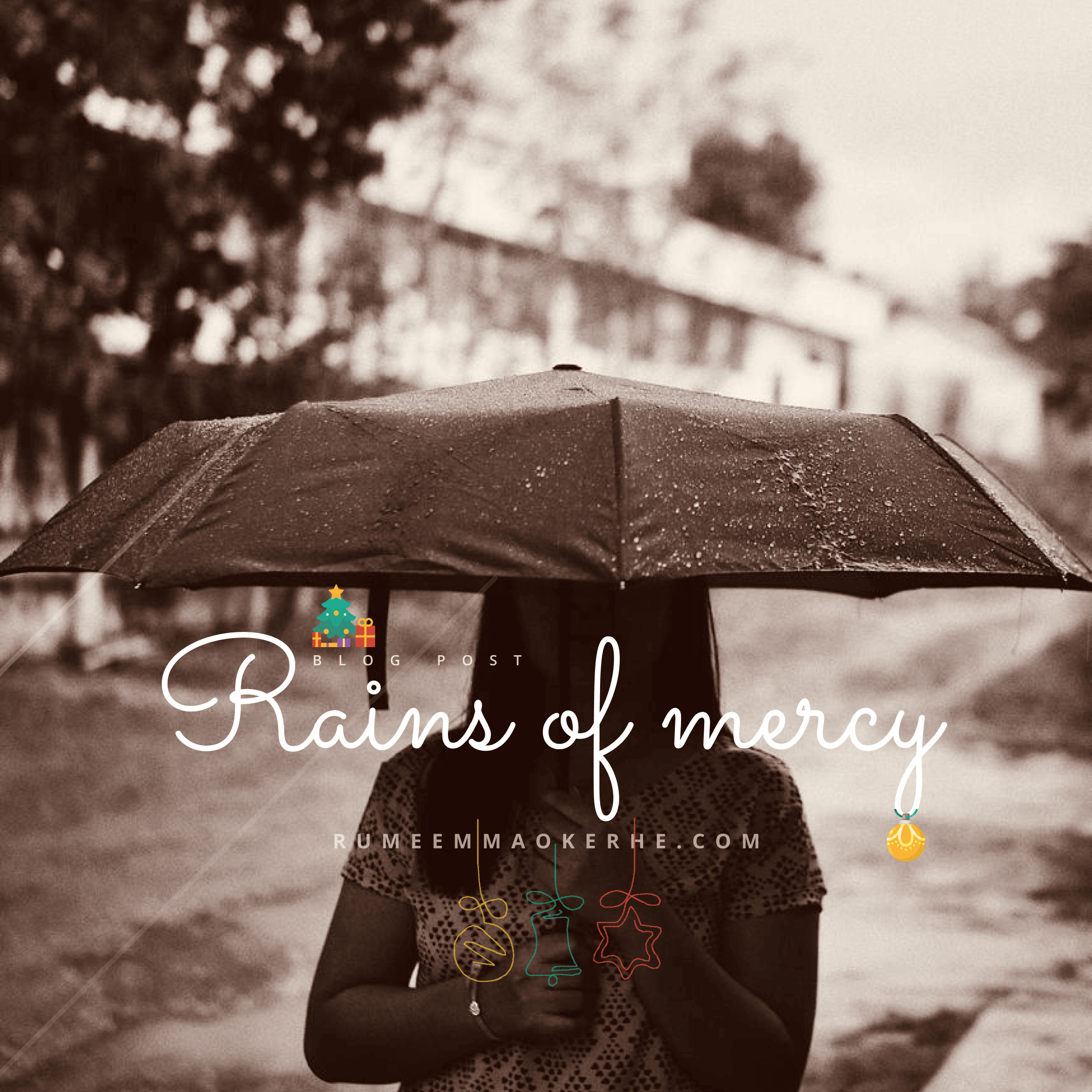
Rains of Mercy
Total Reading Time: 15 minutes Having parents serving in ministry meant being part of kingdom work oneself. As such, Tehillah

Miriam froze as the missive fell off her hand. She would die if caught devising a means of escape. As though it were hot, burning coal, she picked up the envelope, fingers fidgety and tucked it into her tunic. Palms wet, she ascended the stairs that led to the study. No one would see her there. She would select the book her mistress had requested, but before that, quickly peruse the letter. Remembering the details of Lucy’s previous writing to her, Miriam’s stomach turned. She wasn’t sure how she’d feel if Lucy again made excuses for not getting her her manumission.
The paneled hallway with delicate carvings gave way to towering shelves holding musty books. Though she had been born on its stead, and the stylist like other parts of the manor portrayed a fineness of taste and an ambience of wealth, it never felt like home to her. Home was in the small cottage where her parents had lived. Sneaking behind a shelf, Miriam retrieved the missive to read. Fine strokes and curves confirmed both Lucy’s mastery of penmanship and transition from slavery to luxury:
Dearest Miriam,
Oh, how I have missed our conversations at Barbados. London is adorable but it compares nought to the peace of true friendship. I still remember our humble meals of bread and meat when faced with a feast of mutton, cheese and wine. Oh, wine! I shall never forget the exquisiteness the grapevine left for days on my tongue. But while I had been content with little in Barbados, I find myself longing for more than I could have. Oh, ’tis the plague of freedom. One the one hand, as a slave, you’re subject to the will off your master, while on the other hand, in freedom, you become subject to your every whim and caprices. How shall I overcome? I fear I have started to bore you with my childish complaints! Please forgive me. I hope someday you see what I’m trying to say. And aye, I still seek occasion to speak to Mrs. Silversmith about you, but as I explained before, her disposition is such that cannot be predicted. Moreso, she is heavy with child now.
But I shall continue to try. Please send my greetings to Martha, Zainab and the three foreboding hawks. I know they still detest me as I do them. I laugh as I write this. I miss Barbados very much and my ears ache for gossip. Don’t judge me! Tell me all that has happened since our last correspondence.
Your friend,
Lucy.
Miriam squeezed her eyes shut, restraining from crying. Yet a whimper escaped her lips. It hadn’t taken Lucy a year to get her manumission from the hands of amicable Mrs. Silversmith, her mistress, yet it was taking her forever to put in word about the fineness of Miriam’s tapestry. “Tsk,” Miriam hissed.
Miriam knew she would have to find her way herself if she would ever be free. Who knew if she would be resold in the new year? To someone worse than her mistress even? The worn, brown cover of Shakespare’s Hamlet stood out amongst the other books, and Miriam was thankful she didn’t have to look too long. Cleaning her wet eyes with her sleeve, she returned to her mistress and then the sugarcane plantation.
She couldn’t continue this way. She would either die from the exhaustion of labour or starvation. Remembering how Mama had died from a wasting disease, Papa from an unresolving infection and how her brothers had been resold on New Year’s Day, she sobbed. She desperately needed to flee.
Draggy feet approached Miriam, but for the busyness of the field and the brightness of noon, Miriam thought it nothing. It’s probably a slave. Hunched over, she was digging ridges across her portion of land when she felt hands over her back. Alarmed, she sprung to an erect posture. “Who is—”
Mr. Howells wore an insolent smile, one hand holding a stick and the other adjusting his cravat. “Miriam, Miriam.”
How Miriam hated the way Mr. Howells called her name as though he owned her. The steward who worked in her master’s home, always made sure to approach her in a manner that was not appropriate. Once he had taken her hand as she looked for a book in the study and another time, brushed her cheek. “Mr. Howells, I apologize I did not see you coming. I was busy with my duty.”
“It is nothing to apologize about. I assure you.” He squinted and turned his head to the side. “Whatever is the matter? Do not tell me nothing for I care deeply about you.”
Miriam knew it was a lie, but she desperately wanted to think it was true. She wanted some hope. Any hope that somebody loved her and would help her. “It is nothing, sir.”
“I like you, dear Miriam. You seem very special.”
For a moment, Miriam fancied herself the object of a man’s affection, but reason jolted her to reality. “I appreciate your help but I—”
“I could help get your manumission if it’s New Year’s Day that worries you.”
A nervous stutter, “You could?” Like a child given her favourite plaything, her defenses crumbled.
“Of course, I can. I can put in word with your mistress and then we may work out the terms of your manumission.” He raised a finger to her cheek and stroked it so softly, she felt it light like a matchstick.
“I wager that you do not consider me an appropriate companion for you.”
Mr. Howells chuckled, brushing off her comment. He asked that they met at night, in his cottage.
Weeks passed as did the clandestine affair. Although doubts shrouded Miriam’s mind, she hoped Mr. Howells truly loved her and that soon, he would publicly announce her as his wife and pay her manumission. On the day that Miriam declared her pregnancy however, she discovered that Mr. Howells neither made mention of her manumission to her mistress nor claimed to have anything to do with her.
Miriam mourned her foolishness. How had she believed the words of a man who clearly used her? Now, she would birth her child into slavery too. She wrote to Lucy to inform her of her predicament, but no response came. How she hated that girl. Despite all they had both been through growing up as slaves, she acted like she had never been one.
Miriam bit her lip, weeping. She remembered how her mother wished that someday, they would all be free and that they would visit her little village in Badagry, Africa. She remembered how Mama hoped that she would see her younger sister who had been resold on New Year’s Day. She remembered the countless unfulfilled dreams, and knew she could never live as a slave. She would have to do something about the child. She didn’t mind taking her life as well.
Writhing in anguish, Miriam downed the last portion of the poison. She was six months along and cringing from the shame of her bulge. If her mother were alive, she would have wept for the daughter she had carefully raised. Her mother’s words came to mind, but she ignored them. “Amazing grace, that saved a wretch like me.” Though Mama wasn’t a Christian for long before her death, she had sung the words of the former slave trader, John Newton, as though they were hers.
“Oh, Mama.” Miriam grunted, standing by the rivulet that led to Bruce Vale. She had once attended the little church just by this rivulet, but had never understood the preacher’s joy or his members’. It was a joy she also saw in Mama. She had asked Mama how she felt joy despite their horrid circumstances and Mama had reiterated the words of the preacher, “Sometimes, God doesn’t take the storm away, but gives us grace for the storm. And this, my dear, births a purpose for God’s glory.”
Miriam had believed those words—but not for long and not after Mama died. How could good come out of losing her mother to consumption? How could good come out of slavery? Nay, she wanted a way out of slavery and she wanted it now.
A biting pang squeezed her inside. She took a sharp breath in. Soft sobs escaped her lips, in few minutes she would be dead and forgotten like any other slave. Did she really want to die? She tossed a pebble into the rivulet, waiting for the concoction to kick in. By this rivulet, she dreamt dreams of escape as a child, but soon, she’d be dead, long gone, dead… Could she hope for some grace? A grace to save both her and her unborn child. She sobbed, digging her heels into the wet rivulet sand. She didn’t really want to die. “Oh, God have mercy.” Her voice muffled as the night swallowed her into thick darkness.
A sharp headache woke Miriam up. This was not the gates of heaven, for they were made of plates of gold and not moulding woods. Craning her neck to see whose cottage she was in, she caught the reflection of Mrs. Burnaby, the preacher’s wife, talking with her mistress. Mrs. Burnaby curtseyed as Miriam’s mistress left, then returned into the cottage.
“Oh, child. Thank you, Jesus.” Mrs. Burnaby rushed to Miriam who laid at a corner of a room. “We began to fear that you might never wake for you have been asleep all day now.”
Miriam gasped, remembering her child. She felt for the bulge and lowered her shoulders in relief.
Mrs. Burnaby frowned in concern. “You will remain under my watch for now. I have spoken to your mistress and she has permitted you to resume your duties tomorrow.” She walked the length of the room and returned with a cup of tea. “This should help with your chest—you have been wheezing in your sleep. It is the cold. We found you early in the morning.” The hot, ginger tea burnt Miriam’s throat so she took it only in sips. Mrs. Burnaby insisted that she took quick gulps. “No, try, down it all at once or it’ll loose it’s strength.”
Miriam did, sobbing. Why had God spared her life? She didn’t deserve to live.
Mrs. Burnaby was warmer than Miriam would have imagined. Miriam loved her company and started to enjoy fellowship gatherings too. Once, seated in the small, wooden Church, she had sung so deep, she knew she had been blind all her life. Life didn’t consist of the things she had or didn’t have, and as a slave, she realized she could be grateful for where she was even. “Amazing grace, how sweet that sounds.” She sang the hymn in a rich pitch and unabashed surrender. Wherever God wanted her to be, she would stay. She knew she might never be free, but she was satisfied that she was alive—at least.
No longer would she fret about her future.
Lucy’s letter came with a rumble of emotions. Miriam didn’t want to be disappointed again. But as she broke the seal off the envelope, her eyes fell on the unbelievable:
Dearest Miriam,
I apologize for writing late. You wouldn’t believe I met your aunt, Mrs. Jackie Wells at an abolitionist meeting here at England. I spoke to her about you and she is sending forty pounds for your manumission. She has also written to you. Please find her letter in the pouch.
Your friend,
Lucy.
Aunty Jackie? Mama’s younger sister? Nobody had heard from her since she was resold. Questions as well as gratitude filled Miriam’s heart, but she decided to get her manumission first. After that she would unravel the new life only God’s grace could give her. Amazing grace that saved a wretch like me…

Total Reading Time: 15 minutes Having parents serving in ministry meant being part of kingdom work oneself. As such, Tehillah

Total Reading Time: 15 minutes Listen to audio version Frustration burned within Lisa, fervent as the crackling coals at the
2 Responses
Wow I didn’t know when water drop from my eyes .
Sometimes God doesn’t takes the storm away, but gives us strength for the storm .
Thank you for this beautiful write up . God bless you❤️
Glad to be a blessing♥️Thank you for reading, siss🤗♥️